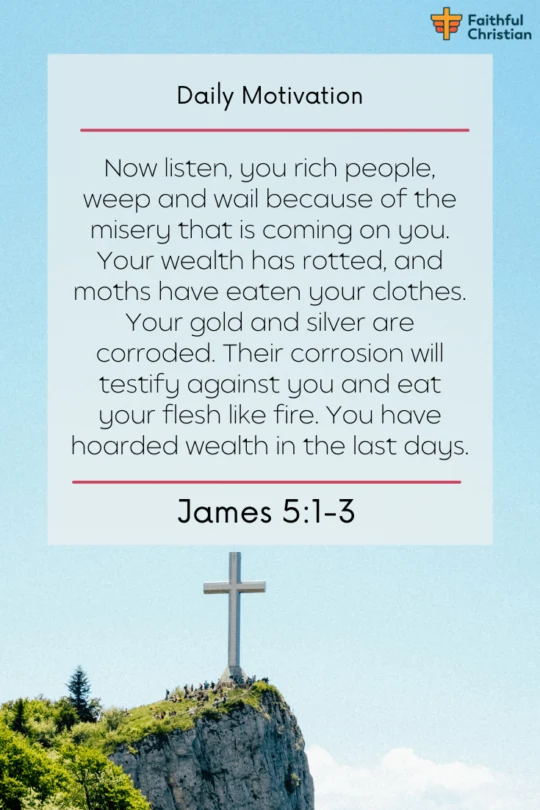In the past, I have had my own share of greed.
While in medical school, I was fortunate to have very caring and loving parents.
At that time, my dad sent me about $50 weekly to take care of my expenses in school.
I had basically everything I needed when I needed it.
And because of this, I lost control of my lust.
I wanted everything and would fabricate lies to get more money from my parents.
I lied about textbooks and practicals to get an additional $300 monthly.
And sadly, it became a part of me all through medical school.
I wasn’t satisfied because my greed initially blindfolded me.
I had friends that did the same thing with their parents.
It was more like a competition to get more money for a wasteful lifestyle.
Thankfully, just after I left medical school, I realized I had sinned against God.
But, what does the bible say about greed and materialism?
Corruption, greed, and materialism are sins before God.
And that’s why the scriptures teach us to be content with what we have.
We must learn to accept the little we have and be contented in our space.
Every part of our life must be as moderate as possible.
Including what we desire, money, how we eat, attention, and lust.
I have put together bible verses about greed and materialism to discourage you from such an act.
Recommended for you
Bible verses About greed and materialism

Ecclesiastes 5:10

Whoever loves money never has enough;
whoever loves wealth is never satisfied with their income.
This too is meaningless.
The wisdom of Ecclesiastes 5:10 is profound: “He who loves money will not be satisfied with money.” This thought-provoking phrase is from King Solomon, a wealthy man. He knew firsthand that riches don’t guarantee contentment.
Solomon’s experience is laid bare in Ecclesiastes 2:1-11. His pursuits of wealth and pleasure brought no satisfaction. Despite his riches, he found it all meaningless. Sounds familiar, right? It’s a story as old as time.
Take Proverbs 23:4-5. It warns us against overworking to be rich. Wealth, it says, can disappear in a flash. Solomon found this out himself: wealth is transient, fleeting. It can’t offer the contentment we crave.
This is seen in the 2008 financial crash. Driven by greed, banks sought quick profits through risky investments. The result? A global financial meltdown. Jobs, homes, and savings were wiped out, and wealth flew away, just as Proverbs warned.
We find a deeper insight in Luke 12:21. The verse recounts the tale of a rich man who stored up wealth for himself but was not rich towards God. This man focused on amassing material wealth, ignoring the more vital spiritual richness.
The price he paid? His life. This stark narrative echoes the inherent risk of prioritizing material possessions over our spiritual well-being.
How can we avoid such pitfalls? Realize that the love of money and obsession with wealth lead to dissatisfaction. Instead, focus on what truly matters: relationships, spiritual growth, and inner peace. These are the treasures that money can’t buy.
A simple way to start is to express gratitude for what you already have. This practice can protect us from the clutches of greed.
In conclusion, while money isn’t evil, the love of it can lead us astray. Let’s take a leaf out of Solomon’s book and find satisfaction in what we have.
The true riches in life aren’t material possessions, but a life lived with love, kindness, and spiritual depth.
1 Timothy 6:10

For the love of money is a root of all kinds of evil. Some people, eager for money, have wandered from the faith and pierced themselves with many griefs.
The Bible often illuminates life’s complexities, and the thorny topic of wealth is no exception. A well-known verse, 1 Timothy 6:10, directly confronts this: “For the love of money is a root of all kinds of evil.”
This scripture targets not money itself, but an unhealthy obsession with it. Money, in itself, is neutral. But when its pursuit becomes overpowering, it can spawn moral and spiritual turmoil.
The life of Judas Iscariot illustrates this profoundly. He traded his teacher and friend, Jesus, for thirty silver coins. His craving for wealth overrode loyalty and faith, ending in catastrophe (Matthew 26:14-16).
We find an echo of this in Bernie Madoff’s story. His immense Ponzi scheme was a testament to money’s corrupting lure. His unchecked greed led to imprisonment and financial chaos.
Let’s turn to Luke 16:13, where Jesus asserts, “No servant can serve two masters…You cannot serve both God and money.” This verse declares that loyalty to faith and fervor for wealth are incompatible, leading us in contrasting directions (more on this in the next verse).
Still, the Bible does not demand a vow of poverty. Hebrews 13:5 guides us towards a balanced perspective: “Keep your lives free from the love of money and be content with what you have…” The Bible advocates contentment, not rejection of money.
Contentment is not mere acceptance. It’s a conscious choice to value what we currently have. It helps us resist materialism’s relentless pace and brings tranquility into our lives.
In sum, the Bible provides actionable advice to avoid greed. It encourages us to practice contentment, appreciate our present possessions, and prioritize spiritual growth.
Because, as I often recall, our life’s worth extends beyond our material possessions.
Matthew 6:24

“No one can serve two masters. Either you will hate the one and love the other, or you will be devoted to the one and despise the other. You cannot serve both God and money.
Matthew 6:24 presents a profound teaching from Jesus: we must choose between serving God and serving money. The dilemma? These two masters demand our full devotion.
Reflect on the story of the rich young ruler in Matthew 19:16-24. Here, a wealthy man, seemingly perfect, asks Jesus about eternal life. Jesus probes his heart, revealing an unhealthy attachment to his riches. The young man had to choose. Devastatingly, he picks money over God.
Jesus reiterates this choice in Luke 16:13. He uses the term ‘mammon’ – an impersonal word that symbolizes the relentless, consuming pursuit of material wealth. He lays bare a stark truth: we can’t serve God and wealth.
There’s an antidote to this, though. Colossians 3:2 nudges us to focus on the things above, not earthly things. Picture your joy, hinged not on the latest iPhone, but on God’s unchanging nature. This doesn’t advocate for a life of poverty, but for balance.
I see this struggle mirrored in today’s world. Consumerism defines us, our worth often tied to our wealth. Endless ads lure us into an insatiable cycle of desire and consumption. Our environment suffers under the pressure. But we can break free.
How? First, identify where your loyalty lies: God or money? Second, scrutinize your desires. Do they fixate on earthly goods or heavenly treasures? Lastly, foster gratitude and generosity. This loosens materialism’s grip and propels us toward our true Master.
To wrap it up, Matthew 6:24 presents a timeless challenge. We must decide whom we serve: God or money. Our choice profoundly shapes our lives. Amid the clash of spiritual devotion and material obsession, may we choose wisely.
Proverbs 1:19

Such are the paths of all who go after ill-gotten gain;
it takes away the life of those who get it.
Proverbs 1:19 says, “Such are the paths of all who go after ill-gotten gain; it takes away the life of those who get it.” This verse draws a direct line between greed and self-destruction.
Think of Achan in Joshua 7. Lured by wealth, he stole during the Jericho siege. The result? His death and Israel’s shocking defeat in battle.
In our era, consider Enron’s downfall. Dubbed “America’s Most Innovative Company,” it collapsed under the weight of corporate greed and fraud. Thousands lost jobs. Shareholders became penniless.
The Bible warns of greed’s peril. It can lead to self-destruction. In Micah 2:2, it underlines the dangers of unjust gain. The verse shows people doing anything to satisfy their wealth lust. They don’t realize the disaster waiting.
Proverbs 28:22 provides a stark picture. It warns of the man “in a hurry to get rich” and predicts his future poverty. The rush for wealth blinds him to the impending doom.
The Bible also guides us towards a healthier attitude. It encourages us to focus on contentment and our eternal inheritance in Christ. As Christians, our wealth should lie in our relationship with God, not earthly possessions.
Integrity and justice should mark our wealth acquisition. It should not come from exploitation or unrighteousness, but reflect Christian values. The question is, “what good is it to gain the world but lose our souls?”
In conclusion, tread wisely. Value people over profit, righteousness over riches. This path leads to life, not self-destruction.
After all, “Such are the paths of all who go after ill-gotten gain; it takes away the life of those who get it.” Proverbs 1:19. These words are indeed ones to live by.
Proverbs 15:27

The greedy bring ruin to their households,
but the one who hates bribes will live.
Proverbs 15:27 asserts, “Whoever is greedy for unjust gain disrupts his household, but he who despises bribes lives.” The verse encapsulates the biblical warning against greed and materialism.
Proverbs emphasizes the destructive nature of greed. It’s not limited to individuals but affects entire households. The verse provides a sharp contrast: the dangers of greed versus the virtue of rejecting bribes. This wisdom isn’t about amassing material wealth. It focuses on spiritual prosperity.
James 4:1-2 presents another angle. It identifies inner desires as sources of external conflicts. Greed, an unsatisfied longing, can drive individuals to harmful actions. It’s not merely the act of wanting but the extreme measures taken to achieve desires.
1 Timothy 6:9 brings a sobering truth: the quest for riches can ensnare. While wealth isn’t inherently negative, obsessive pursuit can be. The fixation on material gain can lead to detrimental choices, resulting in lasting consequences.
Consider Gehazi’s story, Elisha’s servant. His greed led him to deceitfully accept gifts Elisha had refused. His punishment? Leprosy (2 Kings 5:20-27).
This tale underscores the immediate, severe repercussions of greed. Yet, there’s a way forward. Embracing virtues like gratitude and contentment can shield our hearts from materialism’s allure.
Greed extends beyond scripture. Observe worldwide corruption scandals. Officials, under greed’s influence, accept bribes, damaging their integrity. The outcome? Societal distrust and instability. The temporary gains from greed rarely outweigh the lasting damages.
In conclusion, while greed may seem appealing, it often results in pain. Contentment, though sometimes overlooked, is invaluable.
I’ve learned that genuine richness lies not in material possessions but in character. In a world associating value with wealth, I advocate for contentment. True wealth isn’t always tangible.
2 Peter 2:14

With eyes full of adultery, they never stop sinning; they seduce the unstable; they are experts in greed—an accursed brood!
In 2 Peter 2:14, Peter delivers a powerful message. He speaks of people consumed by ceaseless sinful desires. This verse isn’t merely historical; its relevance echoes today.
Peter’s warning centers on insatiable greed. It’s not just about wealth; it’s the unquenchable thirst for ‘more.’
Jeremiah 22:17 illustrates this danger. Here, a king’s actions, driven by dishonest gain, bloodshed, and oppression, are highlighted. King Ahab’s story in 1 Kings 21 offers another stark example. Despite his vast resources, Ahab’s greed drove him to unjustly acquire Naboth’s vineyard.
Modern tales of insider trading mirror Ahab’s story. Individuals misuse secret information for personal gain. Their stories, marked by legal repercussions and tarnished reputations, spotlight greed’s timeless nature.
Paul, in 1 Corinthians 5:11, offers another perspective. He advises against associating with greedy individuals, even if they claim to be fellow believers. The reason? Association impacts character. Immersing ourselves among materialistic people risks our spiritual grounding.
Believers constantly grapple with materialism’s threats. But understanding and confronting these temptations can build resilience against them.
So, what’s the solution? Reflection is key. Recognize what tempts you. Engage with uplifting peers. Dive into scriptures for guidance. Above all, realize true contentment comes from our identity in Christ, not material possessions.
In essence, while greed’s allure seems enticing, it’s a dangerous snare. Through vigilance and faith, we can navigate its pitfalls, ensuring a grounded and enriching life.
2 Peter 2:3

In their greed these teachers will exploit you with fabricated stories. Their condemnation has long been hanging over them, and their destruction has not been sleeping.
The New Testament is rife with warnings about the dangers of greed, especially within religious teachings. 2 Peter 2:3 stands out, cautioning against false teachers exploiting believers. These individuals, motivated by greed, twist truths for profit.
Similarly, in Titus 1:11, Paul speaks of teaching for “shameful gain.” Here, the Gospel’s purity is jeopardized, turning faith into commerce. History showcases the manifestation of this danger.
The tale of Simon the sorcerer in Acts 8:18-24 illustrates this peril. Blinded by greed, Simon tried to buy the Holy Spirit’s power. This sacred gift, he wrongly believed, could be bartered.
Modern times aren’t exempt. Some televangelists focus on personal wealth rather than spiritual wealth. They ask followers for monetary “seeds,” promising blessings in return. Scandals arise, and faith’s reputation suffers.
Jude’s epistle, specifically Jude 1:16, underscores the link between greed and manipulation. Self-serving leaders use their status for personal benefit, not for shepherding their flock. Greed within church leadership isn’t just risky—it’s a betrayal. It compromises the trust of the congregation and dilutes the Gospel’s message.
For believers, there’s a clear defense strategy. First, delve deep into the Scriptures, understanding its core teachings. Second, promote community accountability. With many watching, corrupt practices diminish. Lastly, pray for discernment to recognize the true motives of those teaching.
In a material-driven world, our faith shouldn’t be a tradeable asset. It’s a deep bond with the Divine, deserving reverence.
Luke 12:15

Then he said to them, “Watch out! Be on your guard against all kinds of greed; life does not consist in an abundance of possessions.”
In Luke 12:15, Jesus provides a stark caution: “One’s life doesn’t consist in the abundance of possessions.” This warns against greed’s perils.
Following this, Jesus presents the parable of a wealthy man. This man, having abundant crops, decides to store them in larger barns, believing he’s secured a prosperous future. Yet, that night, his life ends. This story illustrates that life’s value transcends mere possessions.
Drawing from Proverbs 11:28, we glean more wisdom: “Trust in riches leads to a fall, but the righteous flourish.” The message? Wealth is transient; ethical grounding is lasting. In our modern context, this is crucial.
The world’s richest 1% controls vast global assets. However, their opulence often comes at society’s detriment, widening socio-economic disparities.
Hebrews 13:5 offers another dimension: “Keep free from money’s love and be content.” This isn’t opposing ambition. It’s advocating for balance, grounding, and understanding genuine contentment. We must evaluate our desires, emphasizing spiritual over material growth.
To combat materialism, cultivate gratitude. Recognize blessings, support the less fortunate, and comprehend the ephemeral nature of riches. This brings unparalleled joy and peace.
Importantly, while material comforts can soothe, they aren’t life’s cornerstone. True contentment is spiritually anchored, relational, and altruistic.
In sum, as we navigate our modern world, prioritizing spiritual richness over material wealth is paramount. This perspective ensures a fulfilled, balanced existence.
Matthew 6:19

“Do not store up for yourselves treasures on earth, where moths and vermin destroy, and where thieves break in and steal.
In Matthew 6:19, Jesus warns against hoarding earthly wealth. He’s not opposing savings, but the obsession with material accumulation. Earthly treasures, He says, are temporary. They decay or can be stolen.
But in Matthew 6:20-21, He contrasts these with heavenly treasures—those eternal and unbreakable. Here, Jesus sets a clear line: our investments, whether material or spiritual, point directly to our inner values.
1 John 2:15-17 offers a similar caution. The Apostle John urges us not to love worldly values or pursuits. By “world,” he’s hinting at a system. A system valuing status, power, and possessions, often opposing God’s will. He reminds us: worldly desires are fleeting. Only those aligned with God’s will have lasting value.
The biblical tale of Ananias and Sapphira in Acts 5:1-10 paints the dangers of greed. This couple, despite committing to donate all property sale proceeds to the church, deceptively kept a portion. Their demise wasn’t due to the act, but the intent. It was their hunger for praise, combined with dishonesty, that led to their downfall.
Drawing parallels today, our society values status symbols: branded goods, luxury cars, and grand houses. Aspiring for better is human.
But when these aspirations begin defining us, issues arise. The race to outshine peers can lead to financial burdens and stress. We’re essentially mimicking Ananias and Sapphira, prioritizing illusions over truth.
In sum, our investments, in time or wealth, reflect our core values. Do we lean towards the transient or the eternal? The decision, as always, is ours to make.
James 5:1-3

Now listen, you rich people, weep and wail because of the misery that is coming on you. 2 Your wealth has rotted, and moths have eaten your clothes. 3 Your gold and silver are corroded. Their corrosion will testify against you and eat your flesh like fire. You have hoarded wealth in the last days.
James 5:1-3 delivers a striking message to the wealthy: their riches won’t last forever. In fact, they’re decaying. This isn’t just about material decay but the fleeting nature of wealth.
Think of Job. He once had immense wealth but later faced profound loss. Job 27:16-17 underlines how easily wealth vanishes. It’s like dust being blown away by the wind. Wealth is unpredictable and transient.
Proverbs 11:4 brings another angle. It states that wealth won’t offer security when divine judgment strikes. Money may provide comfort, but it can’t shield from consequences. Riches don’t equate to invincibility.
Now, consider Pharaoh from the Bible. He oppressed the Israelites to boost his wealth. This greed brought suffering to many. Ultimately, his riches couldn’t save him. They became his undoing. This story is a reminder: unjust gains have consequences.
Today, we see parallels. Some multinational corporations exploit workers for profit. They chase cheap labor, neglecting worker well-being. This greed mirrors Pharaoh’s tactics, showing that history often repeats itself.
In conclusion, James urges a new perspective. Wealth isn’t about accumulation. It’s about using it rightly. True wealth is integrity, compassion, and justice. These values endure, while material riches fade.
More bible verses about greed and materialism
1 Timothy 3:3
Proverbs 23:3-4
Proverbs 21:25-26
Ecclesiastes 4:8
Ecclesiastes 4:4
Psalm 62:10
Habakkuk 2:5
Ecclesiastes 2:26
Psalm 52:7
1 Timothy 6:9
1 John 2:15-17
Ephesians 4:22
Recommended for you
Greed and materialism: Words for encouragement
1. There is no love in greed
I have already told you how greed affected my life in school.
Sadly I must say, I was so conscious of my lust that I never returned to my senses.
I wanted to get new clothes, phones and have a great time with my friends.
I was concerned more about living a false life earned through my selfishness.
Not once did I ever imagine what it took my parents to send me money.
Each time I asked, they never denied me of anything.
In fact, I knew if I wanted $10000, I would have gotten it.
My parents were pleased with me because I had excellent grades.
But that was never a reason to cheat and trick them for more money.
When greed comes in, love goes out — Both cannot coexist in one soul.
If I had loved my parents, I should have been more concerned about them.
I would have been more concerned about the stress they go through daily to raise a living.
But greed clouded my senses for many years.
Over the years, I have come to realize the grievous sin I committed against my parents.
The truth is, we must put on love over greed.
It is a choice, but you must make the right decisions to be saved.
When love comes into your life, you find happiness in God.
Contentment replaces your lust, and you find yourself trying to help others.
You are no longer concerned about how you look and how much you have in your bank account.
You just want to serve and help others where possible.
The scripture says,
A new command I give you: Love one another. As I have loved you, so you must love one another.
John 13:34
2. Materialism is vanity
The famous Ecclesiastes quote says, “vanity upon vanity, all is vanity.”
We were all born into this world without anything.
We are more like passengers that will leave one day.
One generation comes, tilt the ground of the earth, make money, and goes without taking anything with it.
We have all come into the world to see and experience the beauty of God’s power.
In the end, this generation will disappear, and another must arrive.
So, what’s the point of acquiring riches and wealth?
What’s the point of gathering wealth when you will never have it forever?
I have come to realize that the concept of money is very deceptive.
It gives you a false sense of wellness and happiness.
Immediately wealth arrives; you have a sense of prestige and authority.
But the truth is, it is all vanity and will vanish once death hits.
The scripture says,
“Meaningless! Meaningless!”
says the Teacher.
“Utterly meaningless!
Everything is meaningless.”
3. Be contented, loving Christ
Serving Christ is a grace given to us.
We have been called to serve God, and we must follow his tenets.
We must open our hearts to act like him at all times.
Christ wasn’t a greedy person. He wasn’t concerned about money all through his stay on earth.
He knew for sure that it was all vanity.
Christ was humble and content.
He was caring and was more interested in helping others.
That’s how we must behave as Christians.
If you have just clothing and a place to stay, we must still serve God with joy and happiness.
The scripture says,
For we brought nothing into this world, and it is certain we can carry nothing out.8 And having food and raiment let us be therewith content.
1 Timothy 6: 7-8
Frequently Asked Questions
How do you explain materialism?
Materialism posits that physical matter is the sole reality. This philosophy suggests thoughts and feelings arise from matter. Often, it prioritizes tangible assets and comforts over spiritual or emotional values.
What is the meaning of spiritual materialism?
Chögyam Trungpa Rinpoche coined “spiritual materialism“. This concept describes using spirituality for personal gain. Essentially, it’s making spiritual practices about ego rather than genuine growth.
What is materialism according to the Bible?
The Bible emphasizes spiritual over material pursuits. While not using the term “materialism”, it warns against the love of riches. Key teachings promote spiritual treasures over earthly ones.
Who is an example of a greedy person in the Bible?
Judas Iscariot stands out. For thirty pieces of silver, he betrayed Jesus. This shows the devastating outcomes of choosing wealth over righteousness.
What is the root cause of materialism?
Materialism’s roots are deep and varied. The Bible links it to misplaced priorities. Outside religious texts, it arises from societal pressures and personal insecurities.
What are some Bible verses about greed and selfishness?
The Bible has clear warnings. Luke 12:15 warns against finding value in possessions. 1 Timothy 6:10 labels love of money as an evil root. Hebrews 13:5 promotes contentment over monetary love.
What is the punishment for greed in the Bible?
Greed has its consequences. The Bible warns of spiritual decay, distance from God, and even physical repercussions. Greed can lead to deception and broken bonds.
Is there a Bible verse linking greed to death?
Proverbs 1:19 directly connects ill-gotten gains to death. Greed’s pursuit can, in the end, be fatal.
Which Bible verse talks about the greed for power?
James 4:1-2 delves into greed for power. It suggests our internal desires cause fights and quarrels.
What does God say about greed?
God cautions against greed. Colossians 3:5 lists greed with sins to shun, labeling it as idolatry. Jesus warns life isn’t about possessions.
What does Proverbs say about not being greedy?
Proverbs consistently warns against greed. A notable verse, Proverbs 28:25, states greed causes conflict but trusting in God brings prosperity.
Is greed a sin against God?
Absolutely. The Bible equates greed with idolatry, indicating it’s a sin. Greed replaces God with material desires.
What happens to a greedy person?
Greed comes with a price. The Bible paints a picture of spiritual decline, alienation from God, and dissatisfaction. Greedy pursuits often lead to unintended consequences.

Linda
Saturday 26th of March 2022
Awesome testimony and teaching! Don't forget that the greedy will not inherit the kingdom of God 1 Cor 6:9-10